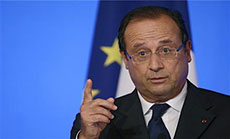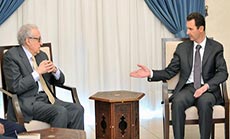Germany Fears Return of European Militants in Syria

Local Editor
The German government announced that up to 700 Europeans are fighting the Syrian government mainly as militants.
 It further warned that the militants could return as "homegrown terrorists" and called for a controversial new policy that would temporarily bar them from re-entering Europe.
It further warned that the militants could return as "homegrown terrorists" and called for a controversial new policy that would temporarily bar them from re-entering Europe.
In the first disclosures of western intelligence from an EU government about Europeans fighting in Syria, senior officials in Berlin said they knew of up to 40 people who had left Germany for the battlefields since last summer. Most of them had German passports.
While German security services monitor the situation closely - the German interior ministry banned three extremist organizations in the past year - the fighters could not be stopped from leaving Germany because it could not be proved that they were going to Syria, the officials said. Their passports could be confiscated, but frequently it was possible to travel to the Syrian border simply using an ID card.
"You can't mark their ID cards ‘Jihadist' or Salafist," a senior official said.
The interior ministry is worried that the fighters will return to Germany where they could operate as "homegrown terrorists" and is pushing for pan-European action to diminish that risk. The chances of success, however, look limited.
Hans-Peter Friedrich, the German interior minister, will raise the issue at a meeting of EU governments next month, calling for a two-year re-entry ban to the EU for the suspected extremists. However, it may be difficult legally to keep them out as most of them carry passports from EU countries, many will often have families in the countries concerned and may have had jobs and entitlements in the EU.
Altogether there were 400-700 Europeans fighting in the opposition in Syria, around 10% of up to 6,000 foreign militants apparently fighting in Syria.
In addition to the Syrian fighters, up to 60 militants had also left Germany for Egypt, officials said. The fighters had been traced to training camps in Somalia where they were taught to use explosives and car bombs, officials said. "Most have joined the extremists. The dangers are growing for us," said the senior government figure.
A year-long survey by King's College London of more than 200 posts on linked websites and hundreds of Arab and western press reports found last month that up to 600 individuals from 14 countries including the UK, Austria, Spain, Sweden and Germany had taken part in the conflict since it began more than two years ago.
The largest contingent, the study found, came from the UK, with estimates of fighters running between 28 and 134. Based on their populations, the figures for Belgium, the Netherlands and Ireland -with about 200 fighters between them - made these countries the most significant, said the lead researcher, Professor Peter Neumann from the International Centre for the Study of Radicalization at King's College. European fighters made up to between 7% and 11% of the foreign contingent in Syria, which ranged between 2,000 and 5,500 people. The researchers also said there were likely to be at least 110 named Europeans engaged in fighting currently.
Source: The Guardian, Edited by moqawama.org
- Related News

France’s Hollande in Qatar for Warplane Deal
9 years ago
Iraq Police Dismantles Al-Qaeda Protest Site
10 years ago

